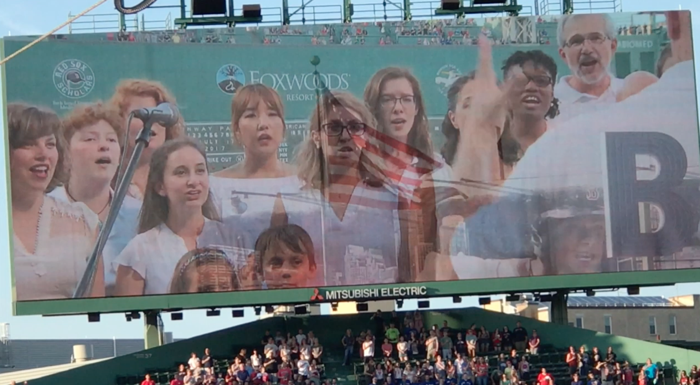
RECENTLY, THE SAINT CECILIA PARISH CHOIR, Boston, sang The Star-Spangled Banner at Fenway Park prior to a Red Sox game. I took the opportunity to customize an arrangement that was not only well-suited to the strengths of this choir, but hopefully expresses the dignity, reverence, and passion worthy of our great country. At the very least, we owe a respectful performance to the selfless people who daily place their lives in mortal danger to defend freedoms we may daily take for granted.
Unfortunately, the National Anthem in America is all too often used as a vehicle to showcase individual performances. Nearly gone are the days in which The Star-Spangled Banner is sung primarily by the entire community in a shared expression. And quite ubiquitous are self-indulgent performances in which the melody is embellished beyond recognition. Among myriad reasons for this is the overwhelming influence of television/media revenue in service of the American culture of entertainment over substance. But we must never forget.
WITH THIS ARRANGEMENT, I HOPE TO BRIDGE THE GAP between individual performance and respectful tribute. It is based on a standard service version found in several hymnals including the new St. Paul Hymnal, the Hymnal 1982, Worship III, etc. However, I made numerous changes. There are small but calculated adjustments to keep repetition fresh. Then there are significant adjustments, (especially in the second half) to paint the text, e.g., a turning point of the text: “Gave proof through the night that the flag was still there.”
FREE DOWNLOAD:
PDF • The Star-Spangled Banner • National Anthem for the United States of America • for SATB Chorus
VIDEO • ST. CECILIA PARISH CHOIR • FENWAY PARK:
PERFORMANCE NOTES:
I have clearly marked breaths in the score: commas for relatively shorter breaths, double lines for longer breaths. The tempo should be sprightly enough to easily sing four-bar phases in one breath. To this end, it helps greatly to very slightly crescendo on the half-notes into the next bar on the words “see,” “hailed,” “stars,” etc.
One of my pet peeves is the common pronunciation of the word “perilous.” This word has a schwa on each of the last two syllables. The sung quarter-note rhythm unfortunately emphasizes the spoken unstressed vowels. This often leads to the word being pronounced: “Peh-RAH-LIS” fight. This annoys me. So, I gave explicit instructions to the choir to pronounce the short “i” and sing, “Peh-ri-lus.” Ironically, it also helps to avoid American “R”s (roll them) in a choral setting (and in such a large venue) to assist with diction.
